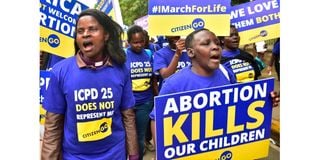800 abortions procured in Uganda daily

Anti-abortion activists demonstrate on the streets of Nairobi in in Nairobi on November 11, 2019 ahead of the ICPD25. Seventy five per cent of abortions in Uganda are done undercover due to restrictive laws.
What you need to know:
- Unsafe abortions are the leading cause of maternal mortality in Uganda.
- Abortion is criminalised in Africa though in countries such as Rwanda, Ethiopia, Sudan and Togo, it is allowed if the pregnancy is out of rape or incest.
Some 800 abortions are procured in Uganda daily, 75 per cent of which are done undercover due to restrictive laws, a human rights advocate said on Tuesday.
Centre for Health, Human Rights and Development Senior Program Officer Rose Wakikona, raised the alarm during a recent live interview with Uganda's NBS television.
"We have to acknowledge that abortions are happening and that the number of lives lost is alarming. In Uganda, we have 800 abortions happening every day. Most of them are done in clandestine conditions,” she said.
She noted that unsafe abortions are the leading cause of maternal mortality. The deaths can, however be prevented if the country enhanced access to contraception, safe abortion services and post-abortion care as well as promoted sexuality education.
The world marked International Safe Abortion Day themed Making Unsafe Abortion History on Tuesday last week.
Rape or incest
But across Africa, abortion is criminalised in exception of circumstances where the life of a mother and/or the health of the foetus is at risk. In other countries such as Rwanda, Ethiopia, Sudan and Togo, it is allowed if the pregnancy is out of rape or incest.
In Kenya, for instance, under Article 26(4) of the Constitution, abortion is permitted only if in the opinion of a health professional, there is need for emergency treatment. And if the life or health of the mother is in danger, or if the abortion is permitted by any other written law.
Even in the case of pregnancy resulting from sexual violence, a health provider and survivor are to refer to this constitutional provision according to 2014 National Guidelines on Management of Sexual Violence in Kenya.
Health Act (2017) defines health as a state of complete physical, mental and social well-being and not merely the absence of disease or infirmity.
Women are, however, dying from unsafe abortions.
Restrictive laws
A 2010 In Harm’s Way: The Impact of Kenya's Restrictive Abortion Law report by Centre for Reproductive Rights estimated that more than 2,600 women die annually in Kenya from complications of unsafe abortion.
Additionally, about 21,000 women are admitted each year to Kenya’s public hospitals for treatment of complications from incomplete and unsafe abortion, spontaneous or induced.
"These high rates of morbidity and mortality from unsafe abortion are due to Kenya’s restrictive abortion law and the rights violations and abuses that stem from the criminalisation of abortion," the researchers argued in the report.
Professor of Human Rights Law at Centre for Human Rights, University of Pretoria, Charles Ngwena, challenged these restrictive laws.
"Regulations on abortion should primarily be on the safety of the service than criminalising it. They should be concentrating more on enabling services," he said during CEHURD's webinar on Regional Approaches to Safe Abortion last week on Tuesday.
Special circumstances
He said: “In South Africa, we have moved away from a crime and punishment model to a reproductive health model. Abortion is legal on request in the first trimester of pregnancy and in special circumstances afterwards."
A 2019 Reproductive Health Bill sponsored by Nakuru Senator Susan Kihika, last year drew much criticism from pro-life activists who accused her of attempting to legalise abortion, thereby making it easier for teenagers to access abortion.
The Bill had also proposed termination of pregnancy if in the opinion of a trained health professional there is substantial risk that the foetus would suffer from a severe physical or mental abnormality that is incompatible with life outside the womb.
It proposed punishment of a health professional who conscientiously objected to the termination of a pregnancy but failed to refer her to another willing to provide this service, with a three-year imprisonment or Sh1 million in fine.





